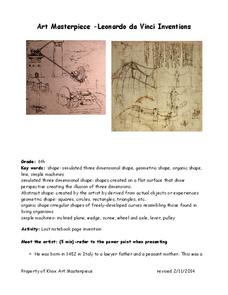Exploratorium
Antigravity Mirror
Is it a bird? Is it a plane? It's super student! Physical science stars can fly during a unit on light as they see the reflection of one leg in a mirror, behind which the other holds them up.
Teach Engineering
Acoustic Mirrors
Investigate sound waves with acoustic mirrors. Using audio software, groups make recordings of musical instruments, both with and without acoustic mirrors. They compare the recordings to see the effect of acoustic mirrors on sound...
It's About Time
Reflected Light
The lesson allows young scientists to use lasers and mirrors to study reflected light. A reading passage and homework question assess learning, while additional material introduces extension activities.
Chandler Unified School District
Art Masterpiece—Leonardo da Vinci Inventions
After getting to know the inventor, Leonardo da Vinci and his many inventions, scholars think up their own invention. Following a written description and a hand-drawn picture, learners use a method of mirror writing and antiquing to give...
Exploratorium
Polarized Sunglasses
Reflected waves of light move within a plane, and because of this, polarizing materials can reduce the glare our eyes see. This resource explains how to set up a demonstration of this effect. Consider it for use in your physical science...
Illustrative Mathematics
Lines of Symmetry for Quadrilaterals
Explore how lines of symmetry help define different categories of quadrilaterals. Looking at a square, rectangle, trapezoid, and parallelogram, young mathematicians discover that each shape has its own, unique symmetry. Encourage your...
Optical Society
Optical Society of America: Optics for Kids: Mirrors and Images
An experiment to investigate how many images appear as the angle between two hinged mirrors is increased. Accompanied by an explanation of what is happening, questions for students to consider, and a link to an article about reflection.
Wolfram Research
Wolfram Math World: Reflection
This site defines reflection, separates reflection into two categories of amphichiral and chiral. The site also gives formulas used in reflective symmetry including point-plane distance, position of reflected points and has links to...
Exploratorium
Exploratorium: Science Snacks: Your Father's Nose
After constructing a frame with a mirror made of horizontal strips, explore what your face would look like if it was made up of half of someone else's.
Science Buddies
Science Buddies: Study Chirality With a Homemade Polarimeter
Some molecules can be either left- or right-"handed." The left- and right-handed molecules have the same number and type of atoms, and their chemical structures look identical, but they are actually mirror images of each other. Many...









